
David Bouton and Joseph Dyckman
Co-heads of U.S. CMBS at Citigroup
Last year's rank: 6

A tale of two cities? Sorry, Charles Dickens — but there’s only one.
Citigroup proved itself as a consistent and formidable market leader throughout the pandemic. In addition to its significant commercial mortgage-backed securities (CMBS) chops — the bank was top loan contributor for both single-asset, single borrower (SASB) and conduit in both 2019 and 2020 — it was busy with non-recourse mortgage finance, mortgage syndications, agency, collateralized loan obligations (CLOs), warehouse/repo financing and secondary trading. Good golly!
“We provide liquidity to not only our biggest sponsors, but our smaller sponsors on the conduit side, which I think shows the breadth of our franchise,” Joseph Dyckman said. “It’s rare for Wall Street shops to be so competitive in both SASB and conduit, and I think we’ve done a great job there.”
Since April 2020, Citi has priced 29 CMBS transactions, 13 as left lead, with a total bookrunner credit of $14.1 billion.
A market canary in the coal mine, the bank served as bookrunner on the first conduit transaction to hit the market after the onset of COVID-19, with the $772 million 2020-GC47 deal, priced in May.
It also acted as left lead bookrunner on the largest SASB transaction since the vaccination rollout, the $2.2 billion floating-rate financing, announced in April 2021 and collateralized by 124 manufactured housing communities for Brookfield; it’s securitized in the 2021-MHC deal.
The jewel in its crown, however, was undoubtedly the 2020-BXLP transaction, closed just as COVID-19 was taking hold. It the largest CMBS deal of 2020 and the second-largest since the Great Financial Crisis. Global pandemic be damned, Citi successfully distributed $3.95 billion of floating-rate debt, including mezzanine, up to 79 percent loan to value, at a blended rate of L+179bps for Blackstone’s acquisition of 349 industrial assets from Colony Capital. (By the way, trivia fans: Citi also led the largest transaction since the financial crisis, in 2019.)
Citi, too, didn’t waver in supporting clients with balance sheet financing when the CMBS markets were pulling back. This included the $500 million mortgage financing provided to Vornado Realty Trust to refinance maturing debt on PENN 11, a 1.1 million-square-foot office building key to the REIT’s Penn Station redevelopment. Citi created liquidity at the height of the pandemic when few could by sourcing demand from nine investors for the deal, largely foreign banks.
And, in case you’re hungry for more, the bank was also the force behind the $415 million 2020-LAB life sciences acquisition financing on behalf of Ventas Life Science and Healthcare Real Estate Fund, and the $388 million refi for Eliot Spitzer’s 420 Kent multifamily project in Brooklyn.
“We’ve had a really nice run in terms of activity, and we feel like we’re hitting on all cylinders,” David Bouton said. “Our platform is global, which gives us a really powerful franchising perspective, right? So, when Joe and I are doing business, we can call our offices in Singapore, Japan, Tokyo, Sydney, London, and we know everyone there.
“It’s like walking down the hallway. We’re very interconnected, which is important, because the big sponsors have also gone global. And, as prices became challenging in the United States, going abroad into the different markets made a lot of sense, because that’s where you can get outsized returns.”—C.C.







